CERAMIC CENTRAL
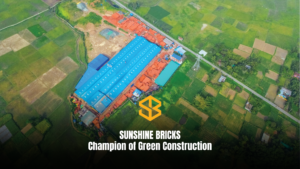
SUNSHINE BRICKS: Champion of Green Construction
“It’s not about 10-hole bricks. It’s about a formula for a lifetime investment.” That is how Sakif Ariff Tabani, vice chairman of Mirpur Ceramics, Khadim Ceramics and Sunshine Bricks, describes the philosophy behind one of Bangladesh’s most ambitious ventures in the building materials sector. In a country where traditional red bricks have long dominated construction, Sunshine Bricks has emerged as a standout brand, reshaping expectations of durability, design, and sustainability. From Habiganj to the National Stage Sunshine Bricks was founded to revolutionise Bangladesh’s brick industry. Based in Habiganj, it serves growing demand for quality building materials nationwide. As part of the Mirpur Ceramics group, alongside Khadim Ceramics—both renowned for manufacturing excellence—the company was created to fill a market gap for ceramic bricks and blocks that combine durability with aesthetic appeal. “With a strong foundation in ceramics, Sunshine Bricks was launched to evolve into a leading brand in Bangladesh’s ceramic bricks and structural clay product industry,” said the vice chairman. Traditional red bricks offered strength but little else. Sunshine Bricks changed that by investing in advanced technology and automation, producing materials that enhance structures while meeting the highest standards of quality. “Over time, Sunshine has become a key player in domestic and international markets, offering sustainable, versatile products for diverse construction needs,” said Sakif Ariff Tabani. The “Wonder Blocks” Sunshine Bricks is not a traditional auto-bricks company using Chinese technology. It is not about producing 10-hole bricks. Instead, it is about creating products that deliver comfortable living conditions and cost savings in energy consumption. Certified for eco-friendly products, the company has positioned itself as a pioneer in sustainable building materials. Among its most celebrated innovations are ceramic clay blocks, branded as “Wonder Blocks”. “These blocks are ideal for high-rise buildings, offering eco-friendly and energy-saving solutions,” said Sakif Ariff Tabani. “Sunshine Bricks is also the first company in Bangladesh to produce facing bricks, coloured and textured bricks, and ceramic blocks—setting it apart from traditional manufacturers.” “The coloured and textured bricks offer architects and developers a wide variety of designs and colours, enabling visually striking facades for residential and commercial buildings,” he said. Produced using cutting-edge technology, these bricks ensure durability, weather resistance, and colour consistency. The ceramic blocks are designed for specific purposes such as soundproofing and lightweight building solutions. Their lightweight nature reduces the overall weight of a structure without compromising strength, while their sound-insulating properties make them ideal for noise-sensitive areas. “By introducing these products, Sunshine Bricks is addressing modern needs such as energy efficiency, noise control, and aesthetic value,” said the veteran entrepreneur. Technology at the Core Sustainability is embedded in Sunshine Bricks’ production process. The company employs state-of-the-art technology to minimise environmental impact while ensuring high-quality output. Its fully automated production line ensures precision and consistency, reducing waste and optimising resources. A key innovation is Tunnel Kiln Technology, which is far more energy-efficient than traditional kiln methods. Tunnel kilns use controlled heat distribution, allowing for consistent firing and better energy use. This reduces the carbon footprint while ensuring higher-quality bricks with fewer defects. Recycling processes are also integral. Water used in manufacturing is filtered and reused, minimising waste. Raw materials are sourced responsibly, and the company incorporates alternative, eco-friendly materials into production. Sustainability is not an afterthought but a guiding principle. The “Green Champion” Recognition The decision to invest in Tunnel Kiln Technology was driven by efficiency and environmental responsibility. Traditional vertical kilns are costly and environmentally damaging. Tunnel kilns, by contrast, allow for consistent production with less energy consumption and precise temperature control. The result is higher-quality bricks with fewer defects. The measurable gains have been significant. Energy consumption has reduced by about 30 percent, while emissions have decreased substantially. The use of alternative fuels in firing further lowers the carbon footprint. These achievements earned Sunshine Bricks the “Green Champion” title, validating its efforts. For Tabani, however, the recognition is more than an accolade—it is a reminder that sustainability in manufacturing is necessary for long-term success. Serving Diverse Markets Sunshine Bricks serves customers across domestic and international markets. Its primary clients include government entities and public sector projects, supplying materials for major initiatives such as the metro rail, railway infrastructure, and education sector developments. These large-scale projects demand durability, consistency, and high quality—hallmarks of Sunshine Bricks. The private sector is equally vital. Developers, architects, and homeowners rely on the company for solutions that are both functional and aesthetically pleasing. From luxury residences to commercial and mixed-use projects, Sunshine Bricks delivers products that meet diverse needs. Internationally, Sunshine Bricks has expanded into the Middle East and Singapore, where demand for innovative, high-quality materials is rising. By tailoring offerings to local codes and design preferences, Sunshine Bricks has ensured adaptability—key to its success across markets. A Legacy Since 1958 Sunshine Bricks is part of a proud legacy dating back to 1958, when Mirpur Ceramics first began producing bricks and building materials in Bangladesh. Over the decades, Mirpur Ceramics earned a strong reputation for quality, reliability, and innovation. That experience and commitment are deeply embedded in Sunshine Bricks today. Drawing on this rich history, Sunshine Bricks represents the modern evolution of Bangladesh’s brick and ceramics industry. Decades of expertise have been combined with advanced automation, eco-friendly technology, and modern design concepts to meet the growing demands of sustainable urban development. Leading the Transformation As Bangladesh urbanises, demand for sustainable, high-quality building materials is rising. Sunshine Bricks sees itself leading this transformation—driving the industry toward greener, smarter, and more design-oriented solutions. The company also seeks to expand internationally, showcasing Bangladeshi innovation through exports to the Middle East and Southeast Asia. With over six decades of experience, Sunshine Bricks is not just building structures—it is helping build a more sustainable and progressive Bangladesh. Redefining Building
Read More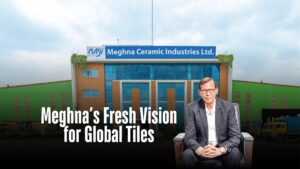
Meghna Ceramic’s Fresh brand redefining Bangladesh’s ceramic industry
Sustainability, innovation, and design leadership define Meghna Ceramic Industries Ltd. (MCIL), a concern of Meghna Group of Industries (MGI). Since its establishment in 2021 under the brand Fresh Ceramics, the company has rapidly grown into one of Bangladesh’s leading tile manufacturers while setting new benchmarks in responsible ceramic production. Nestled in Ashariar Char of Meghnaghat, Sonargaon, Narayanganj — nearly 39 kilometres from the capital Dhaka — MCIL boasts the highest tile production capacity in Bangladesh at 51,000 square metres per day. With cutting-edge machinery from the USA, Germany, Italy, and China, and Bangladesh’s longest kiln (261 metres) under a single shade, MCIL reflects both scale and vision. But what truly distinguishes it is a deep commitment to sustainability and environmental stewardship, ensuring growth aligns with ecological responsibility and worker wellbeing. Sustainability at the Core AKM Ziaul Islam, chief operating officer at Meghna Ceramic, explained how Fresh Ceramics is working to remain true to its promise of “A Fresh Start to an Aesthetic Life.” “We have designed our factory to minimise environmental impact while maximising efficiency.” MCIL has taken six core initiatives: Zero Groundwater Dependency: Surface water treated in-house through a Water Treatment Plant (WTP). Wastewater is purified in an Effluent Treatment Plant (ETP) and safely discharged — ensuring a closed-loop water cycle. Emission-Free Operations: Kilns release only clean white vapour, with no carbon emissions or black smoke. Advanced Heat Management: Controlled heat systems eliminate external heat emissions, ensuring worker-friendly indoor conditions. Dust-Free Environment: A dust management system ensures minimal discharge, protecting workers and the community. Renewable Energy Integration: Solar panels feed into the company’s grid, reducing fossil fuel dependence. Daylight Optimisation: Architectural features reduce the need for artificial lighting, lowering electricity use. Together, these initiatives underscore MCIL’s leadership in sustainable manufacturing and its role as a responsible industry pioneer. “We designed the factory not only to protect the environment but also to ensure a safe, healthy, and efficient workplace for our employees,” Islam added. Vision and Growth “The vision behind MCIL was to redefine aesthetic living in Bangladesh by offering high-quality ceramic tile solutions that combine durability, functionality, and design,” Islam said. Fresh Ceramics started with small-sized tiles before expanding across all ranges and surfaces. Known for glossy tiles with exceptional smoothness, it became the first in Bangladesh to introduce a full line of double charge tiles in three market-winning sizes. Building on that success, MCIL now offers matt and matt-carving tiles, with its R&D team pushing innovation to match modern lifestyles. Nationwide, the brand has built a robust distribution network through dealers, retailers, and exclusive showrooms. Its flagship display centre, “House of Aesthetics,” opened in Dhaka’s Hatirpool, with another underway in Chattogram. Innovation and Technology Meghna Ceramic has invested heavily in advanced laboratories and modern systems, ensuring precision, durability, and design superiority. Its laboratory is currently the most advanced in Bangladesh, capable of analysing raw materials and finished products with extreme precision. Social Responsibility “Our parent company, Meghna Group of Industries, is actively engaged in a wide range of CSR initiatives, contributing significantly to community development across Bangladesh,” said the COO. “Uniquely, we have introduced an insurance policy — the first of its kind in Bangladesh’s tile industry — for over 3,000 tile fitters, recognising their essential role in the sector.” Along with this, every year the “Eid Express” campaign is organised, through which the group ensures safe travel for lower-income tile labourers, workers, fitters, and store assistants at dealer showrooms. MCIL also takes pride in other efforts that the group undertakes to contribute to society. “We have currently employed over 1,500 people across our factory, sales, distribution, and support departments. Women are working side by side with men, ensuring an inclusive and diverse workplace,” Islam added. Meghna Ceramic also maintains a clean, safe, and climate-controlled work environment, where skilled and semi-/non-skilled individuals are hired and provided with on-the-job training to help them gain industry-relevant skills. Challenges and Resilience The ceramic industry faces hurdles such as raw material dependency, volatile energy prices, and high taxation. “Over 90 percent of essential raw materials are imported, making manufacturers vulnerable to global fluctuations,” said Islam. MCIL tackles these challenges by running efficient production lines, sourcing through diversified suppliers, adopting renewable energy, and advocating for supportive policies. Market Leadership and Future Outlook Domestically, Fresh Ceramics has become the highest-selling tiles brand in Bangladesh. MCIL is confident of entering global markets soon, backed by international-standard production and competitive pricing. Meghna Ceramic is preparing to expand into sanitaryware alongside new surface technologies and tile sizes. Its strategy balances nationwide reach with a growing focus on metropolitan and cluster markets. “We actively gather market insights and conduct R&D to drive innovation. Our future expansion is designed to make Fresh Ceramics a complete lifestyle solution for customers,” Islam said. Ready for the Global Market MCIL is not just building for the local market — it’s thinking globally. Its advanced production lines, strict quality control, and trend-driven designs make it a strong candidate for international success. “From the ground up, we built MCIL with a global mindset. Our plant layout, automation level, lab testing capabilities, and product design are all geared toward international markets. We’ve already received interest from buyers in the Middle East and Europe,” said Ziaul. He emphasised the brand’s international readiness and commitment to excellence. “Fresh Ceramics is not just a local brand — it’s designed for global demand. Whether it’s product innovation or packaging, we’ve benchmarked ourselves against top-tier global producers. Our leadership believes that only those companies that combine innovation with responsibility will survive in the global arena.” Leading with Purpose With sustainability at its core, innovation driving its growth, and responsibility guiding its social impact, Meghna Ceramic Industries Ltd. is not just producing tiles — it is shaping the
Read More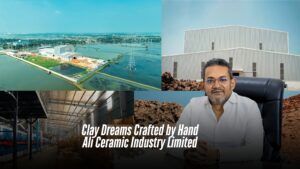
Clay Dreams Crafted by Hand Ali Ceramic Industry Limited
A Parcel That Changed Everything In the early 1980s, a seemingly ordinary parcel delivered from Italy to a Bangladeshi family quietly set the stage for a life-changing transformation. Inside were handmade clay tiles—simple, earthy, and elegant—that inspired a new industrial journey rooted in tradition. The arrival of the tiles sparked an unexpected curiosity, drawing the family, engaged in ship management, into the intricate world of terracotta craftsmanship. This newfound passion led them from coastal shipping operations to the rural “Pal Para” villages, where generations of potters lived and worked. Decades later, that spark has evolved into Ali Ceramic Industry Ltd (ACIL), a rising name in Bangladesh’s ceramic sector. The company is now dedicated to producing 100% eco-friendly terracotta tiles, continuing a legacy built over 43 years. Backed by deep experience and a commitment to preserving clay artistry, ACIL is on a mission to blend sustainability with tradition. However, the ceramic maker had to go through numerous hurdles to reach today’s position. From economic turmoil to energy challenges, Ali Ceramic’s journey has tested its resilience—making its commitment to green craftsmanship truly admirable. From Shipping to Shaping Clay Before entering the ceramic business in 1982, the family of Ali Askar—now the Managing Director of ACIL—was involved in managing ships. Askar himself was just a Grade 9 student when he first began assisting in the family’s factory office. What started as part-time help during his school years gradually grew into a lifelong calling. The pivotal moment came through a surprising phone call. One day, Askar’s father was contacted by an Italian friend who asked if a product could be manufactured in Bangladesh. Without disclosing details, the friend sent a parcel. Inside were handmade clay tiles—a product so visually striking that it would eventually redefine the family’s business path. In Search of the Perfect Artisan Motivated by the parcel, Askar set out on a mission to find skilled artisans capable of replicating such craftsmanship. He travelled across Bangladesh, visiting various districts and exploring ‘Pal Para’—traditional villages of potters where pottery is not just a livelihood, but a way of life. After surveying several regions, Askar discovered exceptional potters in Satkhira. The Italian friend even joined a visit to the village and was impressed by the quality of work. This validation paved the way for launching an export-oriented business producing 100% eco-friendly handmade terracotta tiles under the name Maa Cottos Inc. Maa Cottos and Nikita International: A Legacy in Clay Maa Cottos Inc. serves as the parent company of ACIL, while Nikita International—another venture under the same umbrella—also manufactures 100% handmade terracotta tiles. Founded in 1982 as a family-run enterprise, Nikita International has grown into the largest handmade tile manufacturer not only in Bangladesh but across Southeast Asia. Over the past four decades, the company has built a reputation for high-quality structural clay products, including roof tiles, wall cladding tiles, and floor tiles. Their dedicated in-house research and development team continues to innovate, ensuring they remain relevant in both domestic and international markets. While Nikita International specialises in a broad range of traditional clay products, ACIL has taken a more modern approach, focusing on high-end machine-made terracotta tiles designed for contemporary architectural projects. Ali Ceramic’s Battle to Rise “Ali Ceramic was established in 2021, but its commercial production began in July 2024,” said Ali Askar. With a current daily output of 40,000 square feet of tiles and 170 employees, the company has already made a strong start. Its total investment stands at Tk 1.5 billion. However, Askar noted that despite this solid foundation, ACIL’s growth is being hampered by external challenges such as political instability and economic uncertainty. The July Uprising One such challenge emerged shortly after ACIL began full-scale production. Within a year, Bangladesh was shaken by the July Uprising, which brought government development projects to a halt. According to Askar, many of the contractors they had established relationships with were replaced in the wake of political upheaval, severing existing business ties. The re-tendering process for paused projects introduced further delays and added a new layer of unpredictability to ACIL’s business landscape. Production Challenges: Energy and Raw Materials In addition to political disruption, ACIL has faced ongoing operational difficulties. A key concern is the absence of a Titas gas connection, which has forced the company to rely on liquefied petroleum gas (LPG)—a costlier alternative that significantly raises production expenses. Despite these setbacks, ACIL has managed to maintain product quality. Clay is sourced from regions such as Gazipur and Sylhet, chosen for their reliable natural composition and consistency, ensuring each tile meets the company’s exacting standards. Handmade Tiles: Craft Holds the Crown While machine-made terracotta tiles remain common among Bangladeshi producers such as Mirpur Ceramic Works Ltd. and Khadim Ceramics Ltd., there is a noticeable shift in the global market. Foreign buyers are increasingly drawn to handmade tiles for their aesthetic charm and artisanal value. This growing demand reaffirmed Askar’s decision to launch ACIL as a complement to the handmade offerings already being exported by Maa Cottos Inc. and Nikita International. Reaching 22 Global Destinations Today, Askar proudly notes that handmade tiles produced under the group’s brands are exported to 22 countries—including Germany, France, Italy, Spain, and Japan. The appeal lies in the product’s eco-friendly, handcrafted nature, which resonates strongly with environmentally conscious consumers around the world. Why Imported Tiles Still Dominate the Market Despite this progress, the local ceramic industry continues to face stiff competition from imports. Around 20–25% of Bangladesh’s ceramic demand is still met by foreign tiles, mainly from China, Spain, Turkey, and Vietnam. This dependence stems from Bangladesh lagging nearly five years behind in design and innovation. Although the country has no shortage of skilled ceramic professionals, much of this talent remains underutilized due to a lack of investment in advanced machinery and modern design capabilities. Until the industry catches up in both creativity and technology, imported tiles will likely continue to dominate the high-end segment of the market. A
Read More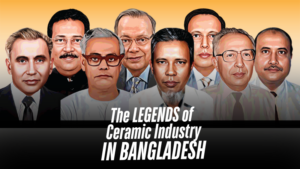
The LEGENDS OF CERAMIC INDUSTRY IN BANGLADESH
The ceramic industry in Bangladesh boasts a rich heritage and has produced several legends known for their significant contributions to ceramics and overall company formation. The industry has grown substantially over the past few decades, establishing itself as a leading sector in the country’s economy. In 1992, with the rapidly growing ceramic industry, a nationally recognized trade organization of manufacturers and exporters of ceramic tableware, pottery, tiles, sanitary ware, insulators, and other ceramic products was formed, called the Bangladesh Ceramic Manufacturers & Exporters Association (BCMEA), under the leadership of many of these ceramic legends. Here, we highlight some legendary leaders and key entrepreneurs who have been instrumental in the journey of the ceramic industry in Bangladesh. These pioneers have laid the foundation for the thriving ceramic industry in Bangladesh, which now covers various subsectors such as tableware, tiles, sanitary ware, and ceramic bricks. Their legacies continue to inspire future generations of ceramic entrepreneurs and professionals. Mohammad Abdul Jabbar Known as the pioneer of the ceramic industry in Bangladesh, Mohammad Abdul Jabbar founded Tajma Ceramic Industries. His contributions laid the foundation for modern ceramic manufacturing in the country. The story of Tajma Ceramic Industries Ltd is quite fascinating. In 1958, the ceramic industry took its nascent steps with only one small tableware manufacturing plant in Bogura. Mohammad Abdul Jabbar, instrumental in promoting and advancing the ceramic factory in Bangladesh, was the Managing Director of the company until his death on May 7, 1985. Tajma Ceramic Industries, recognized as the oldest modern ceramic manufacturing plant in Bangladesh, marked the formal beginning of the ceramic industry in the country. It was the first ceramic earthenware plant to produce porcelain tableware using traditional methods. Tajma played a crucial role in pioneering porcelain tableware production using advanced technology for its time, inspiring many other manufacturers to follow suit. Ariff Wali Mohammed Tabani In 1958, Mirpur Ceramic Works Ltd in Dhaka began producing heavy clay products using German plant and technology, gaining a reputation for manufacturing the best quality ceramic bricks in the subcontinent. The late Ariff Wali Mohammed Tabani, known for his contributions to Mirpur Ceramic Works, played a key role in its evolution. Tabani was the founding Chairman and Managing Director until his death on December 7, 1990. Currently, the company manufactures various types of unglazed tiles and has established two more ceramic companies, Khadim Ceramics and Sunshine Bricks. Both Mirpur Ceramic Works Ltd. and Khadim Ceramics Ltd. have been synonymous with ceramic-based construction materials, manufacturing a comprehensive range of products including blocks, bricks, ornamental screens, claddings, pavers, roofing tiles, and floor and wall tiles, along with the necessary mortars. These materials have been pivotal in landmark projects nationwide, showcasing the group’s commitment to quality and innovation. Md. Abdul Hai Mohammad Abdul Hai was a visionary entrepreneur who founded the country’s first ceramic sanitaryware company, Dacca Ceramics and Sanitary Wares Ltd., in 1969. He embarked on a revolutionary journey in the ceramic sector with the aim of advancing the country through innovative ceramic products. Despite facing political unrest and significant challenges during the Bangladesh Liberation War in 1971, which led to the destruction of the factory and the loss of materials, Abdul Hai was determined to rebuild the company. After the war, he successfully revived the company in 1974. Dacca Ceramics became the country’s first non-heavy clay building ceramic plant and started the production of sanitaryware in Tongi, Gazipur. Under his leadership, the company grew to become a leader in the country’s ceramics industry, known for its high-quality, durable, and cost-effective products. Abdul Hai’s dedication and resilience played a crucial role in shaping the success of Dacca Ceramics, leaving a lasting legacy in the industry. Mr. Hai passed away on December 21, 1995. Ansar Uddin Ahmed A key figure in Peoples Ceramic Industries, Ansar Uddin Ahmed significantly contributed to the industry through innovation and quality control, helping the company gain a strong foothold in domestic market. In 1966, Peoples Ceramic Industries Ltd, formerly known as Pakistan Ceramic Industries and located in Tongi, Gazipur, began production using modern porcelain tableware manufacturing technology from Japan and started exporting their products. The late Ansar Uddin Ahmed, a respected entrepreneur, inspired many in the field. He was the Managing Director of Peoples Ceramic Industries and Standard Ceramic Industries Ltd and passed away on August 14, 2005. He served as the first President of BCMEA from 1992 to 2002, revolutionizing the export of local ceramic products Rashed Mowdud Khan As the Managing Director of Bengal Fine Ceramics Ltd, Rashed Mowdud Khan advocated for sustainable practices and modern technologies in ceramic production, enhancing the global reputation of Bangladeshi ceramics. In 1986, Bengal Fine Ceramics Ltd, the first stoneware tableware manufacturer in Bangladesh, entered both domestic and international markets. The late Rashed Mowdud Khan was a prominent figure in ceramics, known for his artistic and technical expertise. He served as the first General Secretary of BCMEA from 1992 to 2002 and President four times from 2003 to 2009. He passed away on January 9, 2011. Iftakher Uddin Farhad Mr. Iftakher Uddin Farhad was the Chairman & Managing Director of FARR Ceramics Ltd and served as the President of BCMEA in the 2011-13 session. Established in 2005, FARR Ceramics is a manufacturer and exporter of Euro Fine Porcelain tableware. The company began as an export-oriented business in 2007, producing hard porcelain tableware for both international and local markets. Located in Gazipur, Bangladesh, the plant is equipped with state-of-the-art European ceramics manufacturing technology from Germany and Italy, and decal printing technology from Japan. FARR Ceramics currently exports to 31 countries, from North America to Europe, the Middle East, and India, with a monthly production capacity of 2 million pieces. Mr. Farhad passed away on December 25, 2012. Golam Sabur Tulu The founder of Madhumati Tiles Ltd, Golam Sabur Tulu introduced advanced technologies and designs in ceramic manufacturing, significantly impacting the market in Bangladesh. He was a visionary entrepreneur who made significant contributions to the ceramic industry.
Read More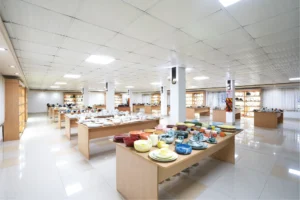
Paragon Ceramic, Pioneering Innovation and Sustainability in a Challenging Global Market
The global ceramic industry, including Bangladesh, is navigating a period of uncertainty due to economic slowdowns, fuel shortages, and inflation. However, Paragon Ceramic Industries Limited (PCIL) has managed to stand out as a leader in this competitive sector, driven by an unwavering commitment to quality and resilience. Below is a closer look at the company’s journey, challenges, and future plans as discussed by its Managing Director, Farian Yusuf. A Journey of Resilience and Early Success Founded in June 2008, Paragon Ceramic began commercial production in December 2010. Remarkably, within just two months, the company achieved its first export, a significant milestone that set the stage for its future success. Despite the current oversupply in the domestic market, Paragon continues to thrive internationally, with exports showing considerable growth. “Our entry into exports soon after production was a major accomplishment,” said Yusuf. “Although the local market is challenging, we are seeing tremendous growth internationally.” Paragon Ceramic: A Leader in High-Definition Porcelain Tableware Manufacturing Located in Mirzapur, Gazipur, approximately 50 kilometers from Dhaka, Paragon Ceramic benefits from a strategic location with access to all necessary infrastructural facilities. With a total investment of over US$ 16 million, PCIL has established itself as a key player in the porcelain tableware industry in Bangladesh. Cutting-Edge Technology and Skilled Workforce PCIL specializes in manufacturing and exporting high-definition porcelain tableware, utilizing state-of-the-art machinery sourced from renowned global suppliers like SKK and TAKASAGO from Japan, TCK from Taiwan, Modena and COTO from China. The factory is supported by a workforce of approximately 1,600 highly skilled and motivated employees, ensuring the highest quality in every product. “In a market where competition from China is fierce due to low pricing, Paragon Ceramic has adopted a strategy of prioritizing product quality over competing on price. China, with its advanced technology and domestic resource pool, offers products at far lower costs than Bangladesh.” Durability and Performance Paragon Ceramic decorated tableware combines vibrant colors and unique shapes that endure even the most demanding dining kitchens. Our proprietary clay recipe, infused with alumina, ensures strength, durability and a pure white finish. Yusuf said “Tested for quality, our products resist fading, chipping, and scratching, even after 500 dishwasher cycles. With advanced shape engineering and glazing techniques, we guarantee functionality, hygiene, and impact resistance”. Innovation and Global Reach Through cutting-edge technology and constant design innovation, Paragon Ceramic stays ahead of trends, offering high-performance tableware. With a robust global distribution network, we ensure timely deliveries worldwide. State-of-the-Art Manufacturing and Quality Assurance PCIL operates with cutting-edge technology, from its porcelain plant to its decal and packaging units. With modern equipment from Japan, Taiwan and China, and a highly skilled workforce, PCIL produces high-definition porcelain tableware for global markets like IKEA and H&M. The company excels in custom designs, meeting clients’ diverse requirements with unmatched flexibility and service. Precision and Excellence in Every Step PCIL’s advanced Mould unit and dedicated Quality Assurance (QA) team ensure every product meets strict international standards. With over 25,000 Mould produced monthly, the team delivers high-quality ceramics while adhering to ISO 9001:2015 standards for superior customer satisfaction. Overcoming the Industry’s Biggest Challenges Paragon has faced its fair share of challenges, from fuel shortages to a shortage of skilled workers. The company’s resilience in overcoming these hurdles speaks volumes. According to Yusuf, the biggest obstacle remains the gas crisis, which has severely impacted production costs and supply. “Fuel costs have skyrocketed by over 250 per cent, yet gas pressure remains very poor, affecting overall production,” he explained. “We’ve had to turn to alternative energy sources but that increases our costs, making us less competitive and facing global challenges to survive” Despite these difficulties, Paragon has continued to expand and evolve, focusing on maintaining its stronghold in international markets while also striving to meet local demand for Porcelain tableware. Quality over Price: A Global Strategy In a market where competition from China is fierce due to low pricing, Paragon Ceramic has adopted a strategy of prioritizing product quality over competing on price. China, with its advanced technology and domestic resource pool, offers products at far lower costs than Bangladesh. However, Paragon’s superior quality remains a competitive edge. “While China has access to its own resources, we rely heavily on imports, which raises our costs,” said Yusuf. “But in terms of quality, we’re second to none and that’s what has helped us to secure buyers internationally.” Reducing Import Duties: A Key to Growth Yusuf believes that reducing import duties on raw materials could significantly boost Bangladesh’s Ceramic industry and its global competitiveness. Since the sector relies entirely on imported raw materials, lowering these costs could fast-track growth and innovation. “If the government offers duty benefits, the sector will see accelerated development. We have the potential, but policy support is crucial to our future,” said Yusuf. Attracting Foreign Direct Investment (FDI) for Expansion Paragon Ceramic is also focused on attracting foreign direct investment (FDI), which Yusuf sees as essential for broadening the scope of the industry. More FDI could increase the number of companies in the sector, giving buyers more options and boosting confidence in Bangladeshi ceramics. “In the same way that Bangladesh’s garment industry grew with increased foreign investment, the ceramic sector can also be benefited,” Yusuf explained. “The more companies we have, the more options buyers have, leading to better overall industry growth.” The Gas Crisis: A Major Production Bottleneck The ongoing gas crisis has led to a surge in fuel prices and decreased availability, creating a substantial challenge for Paragon and other industries. Low gas pressure in industrial areas like Gazipur has severely impacted production as well as quality that reflects on financial statement. “The entire industrial area is affected by this, and it’s not just us—garment and other industries are also facing disruptions,” Yusuf said. “We need long-term solutions for energy security if we are to continue growing.” Technological Advancements: A Path Forward Yusuf emphasizes the need for technological innovation to enhance production efficiency and maintain competitiveness. While inflation has dampened local
Read More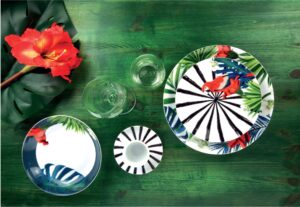
Spotlight Artisan Ceramics at the forefront (04)
Amongst the Royal collection in the Buckingham Palace resides gold-covered renditions of Artisan Ceramics. From a company struggling to export, to winning the national export trophy five times in a row, Artisan Ceramics has seen 3 times expansion over the past few years. The entirety of a company’s growth and success inevitably relies on the decisions made internally. Artisan Ceramics Ltd. suffered significant loss until 2011. With new leadership under Finlays, and a change in the modality of business and redesigning, it now has a factory constructed across six acres of land in Sreepur, Gazipur, and a capacity of producing 10 million pieces of assorted premium quality porcelain tableware annually. The current expansion will raise this capacity to 22 million. Artisan Ceramics is an export-oriented tableware company that supplies to over 20 countries across Europe, America, and Asia, and has evolved into a leading manufacturer with no stop to its growth. The company has a contribution of 12-15 percent in the national export revenue. Surely, success in such a short time is a wonder on its own. To find out more, Ceramic Bangladesh Magazine author recently had the opportunity to discuss the adaptations of Artisan Ceramics that led to its success, with M. Mamunur Rashid, CEO of Artisan Ceramics Ltd. Here’s what we’ve learned: The first adaptation Artisan knew Saggar firing was wasteful Saggar or Saguaro is a covering used over ceramic ware when under intensive firing in the kilns. This protection helps safeguard the ware from coming in direct contact with the Kiln, debris inside the kiln, and other gases and smoke. The problem with saggar firing is that the saggar heats up first and then transfers the heat to the product; this makes the process 15-hour long cycle. With Artisan’s adaptation, open and fast firing, it’s a six-hour firing process. “Time-wise and price-wise, Saggar is inefficient. Again, there is the cost of the man behind the machine,” says Mr. Rashid. Fired three times for a longer life! “I have traveled across more than 10 countries just to see the technology companies have adopted, and learned, that the type of products we tend to manufacture are widely unavailable,” said Mr. Rashid. “We have products that have been fired three times, which make them much more durable. These products are more popular in Europe since they are more durable and can withstand knives and forks,” he added. At Artisan, products are fired at high degrees of temperatures — 1330°C to 1350°C, about 100° higher than the global rivals. Discussing global demand with relevance to this particular firing process, we find: “The hard glaze we are using, makes the product stronger, more scratch-proof, and absorption free,” said Mr. Rashid. The global demand has shifted towards such products because of such features. Raw materials sourced from around the world Artisan Ceramics sources its raw materials from almost every corner of the globe –the UK, Germany, Italy, New Zealand, Vietnam, Japan, China, and India are some of them. The two types of minerals that make up for 50% of the body, feldspar, and quartz, are brought in from Rajasthan, India. The company also imports alumina which is used to make the body stronger and helps meet HoReCa standards. “Using the best quality raw material with a natural colour is important because the glaze is translucent and the body colour is what you see,” he said. These designs are in trend now and a personal favourite of Mr. Rashid. The company even imports from specific mines. Furthermore, Artisan buys the best quality gold from Heraeus Germany and colors from Izawa Pigments, Japan. Innovative Designs that go well with the trend, and the technology behind it. Artisan is constantly working on new designs. “We are innovating and have recently created double-layer body tea cup that keeps tea & coffee warm for a longer period of time,” Mr. Rashid mentioned. The design depends on customer trends and comes in cyclic order, says Mr. Rashid. Something that is currently trending are reactive glazes where you allow the finishing to be exactly how the kilns are making them fascinate many people. “Keeping up with the ever-evolving trends is a constant challenge, but traditional designs have resurfaced and are a popular preference now,” said Mr. Rashid. Artisan will be introducing a certain collection inspired by the Rajasthani culture. A designer from Sri Lanka by the name of Sudath Fernando is also coming in to train employees. Stay tuned with us for future features. Regarding technology, he said: “We want to make our factory fuel efficient. Our dryers are like ovens that collect heat and reuse it. I have visited a few factories in Europe and have seen how they are doing things, we have called SACMI, Italy, to help us upgrade.” The machines at Artisan’s factory are from the USA, the UK, Japan, Taiwan, and China. Artisan has taken green initiatives- they refine and reuse 90% of wastewater, collect rainwater in underground tanks, and reuse heat from the ovens. The company purifies water to the extent that it can be used for irrigation. “Every factory is concerned and the government is putting emphasis on sustainable approaches,” stated Mr. Rashid. Artisan’s plan to sell in bulk Following the recent expansion, Artisan is now concentrating on bulk buyers- examples would be hypermarkets. The marketing team is also trying to bring about a trend change by promoting the use of porcelain over bone china. This is because the water absorption of Bone China is high, it loses colour, and porcelain survives longer. Ultra Bone Porcelain: the newest innovation from Artisan Some customers are price-centric and some look for quality. That is why Artisan needed to innovate a new product retaining the same mechanical strength of pure porcelain and exceptional whiteness that was sure to win people over. Henceforth, came the Ultra Bone Porcelain. Mr. Rashid introduced a special body that can beat the competition and customers are willing to pay premium price for it. Artisan performs CSR Artisan gives education
Read More
Artisan Ceramics at the forefront
Amongst the Royal collection in the Buckingham Palace resides gold-covered renditions of Artisan Ceramics. From a company struggling to export, to winning the national export trophy five times in a row, Artisan Ceramics has seen 3 times expansion over the past few years. The entirety of a company’s growth and success inevitably relies on the decisions made internally. Artisan Ceramics Ltd. suffered significant loss until 2011. With new leadership under Finlays, and a change in the modality of business and redesigning, it now has a factory constructed across six acres of land in Sreepur, Gazipur, and a capacity of producing 10 million pieces of assorted premium quality porcelain tableware annually. The current expansion will raise this capacity to 22 million. Artisan Ceramics is an export-oriented tableware company that supplies to over 20 countries across Europe, America, and Asia, and has evolved into a leading manufacturer with no stop to its growth. The company has a contribution of 12-15 percent in the national export revenue. Surely, success in such a short time is a wonder on its own. To find out more, Ceramic Bangladesh Magazine author recently had the opportunity to discuss the adaptations of Artisan Ceramics that led to its success, with M. Mamunur Rashid, CEO of Artisan Ceramics Ltd. Here’s what we’ve learned: The first adaptation Artisan knew Saggar firing was wasteful Saggar or Saguaro is a covering used over ceramic ware when under intensive firing in the kilns. This protection helps safeguard the ware from coming in direct contact with the Kiln, debris inside the kiln, and other gases and smoke. The problem with saggar firing is that the saggar heats up first and then transfers the heat to the product; this makes the process 15-hour long cycle. With Artisan’s adaptation, open and fast firing, it’s a six-hour firing process. “Time-wise and price-wise, Saggar is inefficient. Again, there is the cost of the man behind the machine,” says Mr. Rashid. Fired three times for a longer life! “I have traveled across more than 10 countries just to see the technology companies have adopted, and learned, that the type of products we tend to manufacture are widely unavailable,” said Mr. Rashid. “We have products that have been fired three times, which make them much more durable. These products are more popular in Europe since they are more durable and can withstand knives and forks,” he added. At Artisan, products are fired at high degrees of temperatures — 1330°C to 1350°C, about 100° higher than the global rivals. Discussing global demand with relevance to this particular firing process, we find: “The hard glaze we are using, makes the product stronger, more scratch-proof, and absorption free,” said Mr. Rashid. The global demand has shifted towards such products because of such features. Raw materials sourced from around the world Artisan Ceramics sources its raw materials from almost every corner of the globe –the UK, Germany, Italy, New Zealand, Vietnam, Japan, China, and India are some of them. The two types of minerals that make up for 50% of the body, feldspar, and quartz, are brought in from Rajasthan, India. The company also imports alumina which is used to make the body stronger and helps meet HoReCa standards. “Using the best quality raw material with a natural colour is important because the glaze is translucent and the body colour is what you see,” he said. These designs are in trend now and a personal favourite of Mr. Rashid. The company even imports from specific mines. Furthermore, Artisan buys the best quality gold from Heraeus Germany and colors from Izawa Pigments, Japan. Innovative Designs that go well with the trend, and the technology behind it. Artisan is constantly working on new designs. “We are innovating and have recently created double-layer body tea cup that keeps tea & coffee warm for a longer period of time,” Mr. Rashid mentioned. The design depends on customer trends and comes in cyclic order, says Mr. Rashid. Something that is currently trending are reactive glazes where you allow the finishing to be exactly how the kilns are making them fascinate many people. “Keeping up with the ever-evolving trends is a constant challenge, but traditional designs have resurfaced and are a popular preference now,” said Mr. Rashid. Artisan will be introducing a certain collection inspired by the Rajasthani culture. A designer from Sri Lanka by the name of Sudath Fernando is also coming in to train employees. Stay tuned with us for future features. Regarding technology, he said: “We want to make our factory fuel efficient. Our dryers are like ovens that collect heat and reuse it. I have visited a few factories in Europe and have seen how they are doing things, we have called SACMI, Italy, to help us upgrade.” The machines at Artisan’s factory are from the USA, the UK, Japan, Taiwan, and China. Artisan has taken green initiatives- they refine and reuse 90% of wastewater, collect rainwater in underground tanks, and reuse heat from the ovens. The company purifies water to the extent that it can be used for irrigation. “Every factory is concerned and the government is putting emphasis on sustainable approaches,” stated Mr. Rashid. Artisan’s plan to sell in bulk Following the recent expansion, Artisan is now concentrating on bulk buyers- examples would be hypermarkets. The marketing team is also trying to bring about a trend change by promoting the use of porcelain over bone china. This is because the water absorption of Bone China is high, it loses colour, and porcelain survives longer. Ultra Bone Porcelain: the newest innovation from Artisan Some customers are price-centric and some look for quality. That is why Artisan needed to innovate a new product retaining the same mechanical strength of pure porcelain and exceptional whiteness that was sure to win people over. Henceforth, came the Ultra Bone Porcelain. Mr. Rashid introduced a special body that can beat the competition and customers are willing to pay premium price for it. Artisan performs CSR Artisan gives education
Read More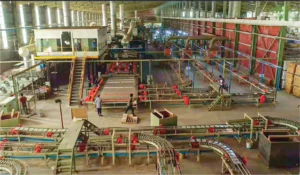
Crafting Timeless Excellence
BHL CERAMICS, the flagship brand owned by BHL GROUP Pvt. Ltd., has evolved over three decades as a dynamic business house and consumer products manufacturer. Since its inception in 2017, BHL Ceramic Co. Ltd. has become one of Bangladesh’s largest ceramic tile manufacturers, symbolizing artistry and creativity. The company’s mission is to reduce reliance on imported foreign tiles and boost domestic production, creating employment opportunities.
Read More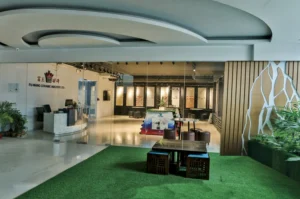
Fu-Wang Ceramic Industry A Journey of Resilience and Growth
FU-WANG Ceramic Industry Limited, founded in 1995 as a joint venture between Taiwan and Bangladesh, has evolved into a major player in the ceramic industry. Despite Taiwan investors’ departure in 2008, the company continued to thrive, reshaping the landscape of ceramic production in Bangladesh. During the 1990s, Bangladesh heavily relied on ceramic imports from countries such as China, Sri Lanka, Spain, and Italy. Fu-Wang entered the market and made a significant impact. Subsequently, other prominent players like RAK, CBC, and Mir Ceramic joined, solidifying their presence in the country’s tiles market. Presently, RAK, DBL, Fresh, Fu-Wang, and X Ceramic are the key players in Bangladesh’s tiles sector. With an aggregate investment of $1.8 billion in the ceramic sector, of which 66 per cent is allocated to the tiles, the domestic tile market is valued at $650 million. Fu-Wang Ceramic Industry went public in 1998, listing its shares on the Dhaka and Chattogram Stock Exchanges. Fu-Wang Ceramic has created a good number of employment opportunities. Its products are manufactured in the factory of Gazipur. The company has since maintained impressive annual growth, consistently achieving a 20 per cent increase. Product diversification and challenges faced Fu-Wang Ceramic Industry is known for producing two types of products: those tailored for the mass market including industries, universities, shopping mall etc. and luxurious tiles designed for apartments, hotels and offices. The company has also introduced high-quality brands like Picasso and Picasso Premium, offering larger wall sizes and various floor sizes tiles under the guidance of European and Asian technologists. The foundation of Picasso Premium 60x60cm PGVT tiles lies in state-of-the-art robotic technology. Each tile is crafted with unparalleled precision and accuracy, ensuring uniformity in size and shape. The company employs Nano Technology in the production of PGVT tiles, enhancing their durability and shine. This advanced technology creates a protective layer on the tile surface, making them resistant to scratches, stains, and wear. The timeless elegance of marble, the warmth of wood, or the modernity of concrete, Fu-Wang designs capture the essence of nature and elevate the interior design to new heights. Each of 60x60cm PGVT tiles is meticulously packed with a surface protective film. This film safeguards the tiles during transportation and installation. However, the industry currently is facing a range of challenges. These include difficulties in opening Letters of Credit (L/C), surging natural gas prices coupled with low gas pressure, and unreliable electricity supply to factories. Moreover, navigating the intricate landscape of government policies has posed additional obstacles for businesses in Bangladesh. Besides, current economic headwinds has contributed to decline in the sales of the ceramic products. To carry on the business, the government should withdraw Supplementary Duty (SD) on the local ceramic products and supply gas and electricity uninterruptedly to the factories. The CEO of Fu-Wang Ceramic Industry Limited (FWCIL), Mr. Rafiquzzaman Bhuiyan, shared his experiences with the Ceramic Bangladesh (CB) in an exclusive interview. Adapting to market dynamics Despite these challenges, Fu-Wang Ceramic Industry remains steadfast in its commitment to leading the tiles sector in Bangladesh. The CEO recognises that competition is intensifying, and only large companies will be able endure while smaller ones might face closure. Making profit is tough due to competition. Besides, the demand for high-value and luxurious products is increasing in local and international markets. So, small companies have to compete with large companies. However, considering current market demand, they have to change product designs in accordance with new technology. Now local companies are meeting 85 per cent domestic market demand. And the rest of 15 per cent is met by imported products. If they can reduce import dependency further, dollar reserve will increase. So, policy support is crucial. “Our plan for the future is to manufacture selective and valuable products to compete in the market. We will expand our production base. Mass production helps to reduce product costs. We will produce high-value products in the future increasing market demand,” said Mr. Rafiquzzaman Bhuiyan. To meet the evolving market demands, Fu-Wang plans to adapt its product designs using new technologies. Moreover, they aim to reduce their dependency on imported products to bolster their reserves. The company’s strategy for the future is to manufacture selective and high-value products to cater to the increasing demand in both local and international markets. Export challenges, domestic potential While the export market has presented challenges due to global competitiveness, the domestic market for tiles has experienced significant growth. Changes in people’s lifestyles and increased per capita income have contributed to the surge in demand. Fu-Wang is exploring the possibility of entering the tableware manufacturing sector and is focusing on branding and digital marketing to expand its market presence. A call for government support and FDI The domestic demand for tiles has increased vastly thanks to change in people’s lifestyles and booming construction sector. A good number of companies have also been established here. In Bangladesh, the number of tile companies may further go up as tiles are now used in rural areas too. So the market is expanding, and it will continue to expand. People are spending more money on their houses as a pre-emerging country. In this context, Fu-Wang management is planning to what type of new products can be brought in the market in future. Meanwhile, Bangladesh has made a reputation in the international market exporting high-valued tableware products. However, there is a huge potential for foreign direct investments (FDI) in Bangladesh. The government has set up 100 special economic zones, something which is a positive initiative to bring more FDI. Also, there are some challenges including land scarcity, gas and utility supply, and the business operational registration process. All problems should be resolved as soon as possible. Besides, transparency and accountability are crucial to ensure ease of doing business. Basically, the country’s all services should be available on online. Mr. Rafiquzzaman Bhuiyan underscored the need for government support, including withdrawal of supplementary duty on local ceramic products, reducing import duties on raw materials, uninterrupted gas supply, and reliable
Read More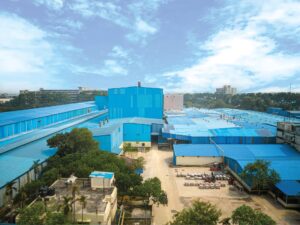
MIR CERAMIC Dominates The Quality Tiles Market
Mir Ceramic Limited (MCL) is one of the largest, prominent ceramic and porcelain tile manufacturers in Bangladesh. The most trusted tiles manufacturer was founded in 2001 and began commercial production in 2002 with the globally acclaimed Italian brand SACMI’s state-of-the-art machinery, widely acknowledged as the best ceramics manufacturing equipment provider in the world. Mir Ceramic is a proud member of Mir Group of Companies, one of the oldest and highly reputed conglomerates in Bangladesh. The Group began its journey in 1968 as Mir Akhter Hossain Limited (MAH), the iconic construction company in Bangladesh. The group has diversified into real estate, banking, telecommunications and ICT industries. Mir Ceramic produces a range of high-quality products such as porcelain tiles, ceramic wall tiles, granite floor tiles, homogenous stair tiles, and industrial tiles. One of their most popular products is the Mir polished tiles, which are renowned for their exceptional durability and smooth finishing. It has a production capacity of 90,000 square meters of tiles per month. Proudly promoting ‘Made in Bangladesh’ with a combined workforce of 2,000 local craftsmen and artisans for manufacturing. Mir Ceramic Ltd prides itself on its commitment to quality and customer satisfaction. With a team of experienced professionals and the latest technology, they strive to deliver the best possible products to the customers. The company is constantly innovating and expanding its product line to meet the changing needs of the market. Skilled Manpower, Innovation, World-Class Machinery and Raw Materials are behind the Success As one of the leading ceramic and porcelain tile manufacturers, Mir Ceramic Ltd has established a strong reputation for excellence in the industry. Its products are highly sought after by builders, architects, and homeowners alike, who appreciate the quality, durability, and style that the company delivers. Mir secures the highest quality raw materials from across the world, including Spain, Italy, Malaysia and Thailand. MCL has assembled an expert production team, with decades of experience in the industry, to oversee manufacturing. As a result, Mir Ceramic produces tiles with the highest bending strength and lowest water absorption in Bangladesh. Consistently producing superior quality tiles for over so many years has helped establish Mir as a dominant player in the upscale tiles market in Bangladesh. Mir Ceramic’s vision is to create a world where those who won’t settle for anything but the best can proudly use tiles made right here in Bangladesh. MCL is committed to producing the strongest and longest lasting tiles in the country by continually adopting the latest manufacturing technology and sourcing the very best raw materials from around the globe. MCL takes a customer centric approach to product development, by continually engaging customers and technology partners to develop products that meet the evolving needs of the discerning clients. MCL aims to achieve growth while continuing to be environmentally responsible. To achieve this, the company continually leverage the latest technologies to increase the efficiency of manufacturing and energy generation processes and captures and reuses energy, waste raw materials and water. Manifold regulations are key hurdle for local and foreign investors “Once the use of ceramic products in Bangladesh was comparatively low. This was due to low purchasing power of people and high cost of ceramics products at the time. Earlier, the country was heavily dependent on imports spending huge amounts of foreign currency. This inspired the Group to enter the tiles manufacturing business in 2001. By producing tiles locally, we saw an opportunity to not just to reduce import dependency but also value add and create well-paying jobs,” Ruslan Nasir, Deputy Managing Director of Mir Ceramic Limited (MCL), told the Ceramic Bangladesh magazine. He said, once upon a time, there were only a handful of companies producing tiles in Bangladesh. Most tiles produced locally were unable to meet international standards. Mir Group established MCL with a clear objective: to make the strongest and longest lasting tiles in Bangladesh. Since its inception, Mir Ceramic has utilised Italian manufacturing equipment. MCL secures only the highest quality raw materials. Ruslan Nasir said, “Mir has played a pioneering role in the manufacture of quality tiles by being the first local company to utilise European machinery. From day one, we were very serious about the quality of our products. This helped establish Mir as one of the largest and most trusted tiles manufacturers in Bangladesh. Till date, Mir Ceramic is the only ceramics company to be awarded the prestigious President’s Industrial Development Award.” “However, the company faced many challenges in the early days. One of the greatest challenges was the lack of skilled manpower at that time. Mir invested heavily in skill development, through a combination of hiring workers with international experience and hiring foreign trainers to develop local talent. Skilled manpower development, combined with world-class machinery and raw materials, helped Mir Ceramic bring tiles of international quality to the Bangladesh market.” In the last 10 years, the ceramics sector in Bangladesh has experienced phenomenal growth. Today, locally made high-quality ceramic products are more readily available in the country. Recent studies reveal that local capacity is now capable of fully meeting the demand and accounts for over 80% of local consumption. Local manufacturers are benefiting from economies of scale thus driving down prices. This has made locally made ceramics products affordable to a larger segment of the population. As a result, the ceramic sector in Bangladesh has grown 200% in the last decade, creating 60,000 jobs directly in the process and 5,00,000 indirectly. Founder of Mir Ceramic Ltd. and Managing Director, Mir Nasir Hossain is a leading business figure of Bangladesh. He has served as President of the Federation of Bangladesh Chambers of Commerce and Industries (FBCCI), the apex trade organisation. He established Mir Ceramic with a clear objective of producing the strongest and longest lasting tiles in Bangladesh. As Managing Director of Mir Telecom Ltd., Mir Nasir Hossain has received the National Export Trophy (Gold) from the Prime Minister of Bangladesh on multiple occasions. However, the industry has faced significant challenges in recent times which could threaten
Read More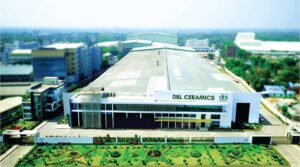
DBL CERAMICS Conservation and Sustainability
Between depleting natural resources and a dire need to conserve and restore nature is the upsurging imperative to ensure industrial growth. An emerging economy like Bangladesh needs urgent transition to a more greener approach when it comes to growth, a resurgence of a 52 year-old nation. Focusing On Ceramic Industry While the product itself is environment-friendly, the production process causes 0.29 tonne of CO2 emission for every tonne of ceramic produced. Following a worldwide awareness, nations are turning to sustainable approach. The ceramic companies in Bangladesh are adapting to it as well. On a broader perspective, the 2023 SDG report says, one in every two countries lacks an effective framework for sustainable water management. From 2015 to 2020 there has been a slight improvement when it comes to SDG implementation. This, however, needs to be doubled if we want to meet the global goals. As Bangladesh has pledged to implement SDGs and comply with global standards, its ceramic sector has seen sustainable growth. DBL Ceramics, a concern of the DBL Group, is a young ceramic manufacturer, established in 2017. In a very short period of time, the company has reached the current position as one of the top manufacturers of ceramic tiles. DBL tiles are made for almost every surface –regular floors, high-endurance/areas with heavy traffic, gymnasiums and so on. The past few years saw substantial growth of the company which has over 160 dealers and 6 display centres in Dhaka, Chattogram, Rangpur, Sylhet and Barishal, with plans to expand to Khulna and Rajshahi. DBL has also made significant investments in reusable resources and waste water management, amongst other sustainable initiatives. In an attempt to reduce waste water, DBL has installed waste water treatment plants capable of treating 18,720 cubic meters of wastes by product everyday. State-of-the-art machineries at DBL SACMI kilns to turn clay to ceramic, Ball Mills for fine grinding, and Air Power glazing line–most of DBL’s machineries are energy efficient motors. They have inverters, energy cogeneration system, machines to reuse energy from kilns and dryers, along with other equipment to reduce wastes. To add a bit more automation to the mix, the company has Techno Ferrari for handling and storage. Ceramic Bangladesh Magazine visited DBL’s Gulshan office recently and sat with its head of operations Md. Bayazed Bashar to discuss his experience in the industry, future plans of the company, export difficulties, and more issues. DBL is a relatively young company but has fast become one of the top tier tiles manufacturers in the country. It has some of the best showrooms in the country and provides clients with an immersive experience, allowing them to visualise the product better. “Ever since I joined DBL, I’ve had unwavering support from our management. I was on project implementation when I joined, and I am thankful for the faith our management had in us, which consequentially resulted in our performance and growth” said Mr. Bashar. “DBL ceramics is the first diversified project for the DBL Group. We have an R&D (research and development) team working on innovation and we have become one of the top brands within a short time. We uphold our standards through our service quality and innovation,” he said. In terms of growth, DBL has been adding a production line every alternative year, and now has the capacity of producing 35,000 square meters per day from the initial capacity of 8000 sqm. The conversation ensued as we talked about the initial steps of a career in the ceramic industry, Mr. Bashar said, “It’s very difficult to find a mentor who can guide you in the earlier years of your career, especially after graduation. A mentor can help you choose the right track, giving you opportunities, and helping you polish yourself. I’m really happy to have had the opportunity to join DBL Ceramics, and found my own mentor here.” He added, “I have seen individuals get frustrated with their jobs if/when they get no opportunity to work on their competency. Once given the opportunity to explore, a working professional finds more interest in his work and solidifies into an asset for his company.” When asked about the hurdles of a career in this industry, Mr. Bashar recalled the tougher times and the ever-existing troubles. Having passed through them, he is now happy with where he stands and what he has learned through the experiences. He stated, “I am happy to have chosen this path for my career, considering that I was inclined towards doing what my friends did – going abroad for higher studies after graduation. Instead I joined DBL in 2007.” One of the most recent initiatives of the company is the Tiles manufacturing project in Sylhet. The extension is called Bright Ceramics – a tiles, tableware and sanitary-ware manufacturing plant, which will finish construction by the end of next year. DBL is also working on advanced ceramic products. According to Mr. Bashar, among some of the major drawbacks of this industry is import dependency. The added disadvantages due to incremental gas price and shortage create a much greater impact on the production cost. A shortage of gas supply results in on-and-off gas in the kilns – slows down in production. According to Mr. Bashar, the added cost has only been inflicted on the manufacturers and the customers are unaffected. “The duty structure really surprised everyone. We are paying full duty on imported clay that is 25-30 per cent moisture.” Mr. Bashar pointed out. On a brighter note, DBL will be the first player in the subcontinent to incorporate Industry 4.0- allowing it to collect data analysed later on a big screen. AI for DBL Ceramics DBL has already started with AI (artificial intelligence) for ceramics. It is planning on a full automation for the factory that will function with minimal human intervention. Mr. Bashar could only tell Ceramic Bangladesh Magazine that the AI software is being developed by an international IT company, and soon, will be set in motion. Concerning imperatives Some of the
Read More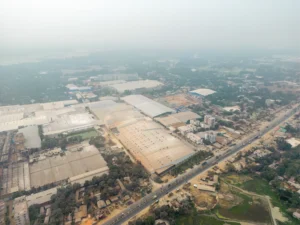
RAK LIKES BEING ITS OWN RIVAL
The ceramics industry in Bangladesh has a huge potential in terms of sustained infrastructural development the country has witnessed over the years. The construction sector has boomed, thanks to growing property development, housing, rehousing, gentrification and urban renewal. Building industry involves so many materials for exterior and interior décor and furnishings. Ceramic is an essential component of interior ornamentation to give a structure, be it a modern house, hotel, motel, cottage or a corporate office, both elegant look and taste.
Read More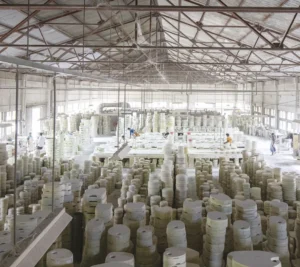
Shinepukur Ceramics Export Giant In Tableware Market
Becoming the number one is a challenge, and retaining that position brings about a bundle of never-ending hurdles that very few companies can tackle. Shinepukur Ceramics Limited (SCL) has been in the top position in the tableware segment, in terms of revenue and market share, for the past couple of years. Export is Shinepukur’s strong suit – It has been exporting high-grade porcelain (since April 1999) and bone china (since November, 1999) tableware and has established dominance in the export market. The company’s CEO says quality is the core reason why SCL products are in such demand abroad. It exports products the USA, Canada, the UK, Germany, France, Italy, Japan, Sweden, Norway, Denmark, Finland, Spain, Poland, Mexico, Brazil, Chile, UAE, Australia, New Zealand, Turkey, India, Egypt and Russia. Shinepukur’s “compliant factory” has been audited multiple times by SMETA, BSCI, GMP, and CTPAT, and has received an ISO 9001:2015 certification. Its tableware complies with the Norwegian Standard, California State Prop 65 Standard, and the EU Standard. Dhaka) shelters the SCL, a member company of Beximco Group. Registered in 1997, the company’s plants were commissioned in 1998, and started production in 1999. BEXIMCO Industrial Park (near Dhaka Export Processing Zone, 40 kilometres off Shinepukur is capable of making surreal tabletops with high durability for airlines, hotel ware, and other industrial usage. The versatility of the production houses allows the company to reach out to all demographics of ceramic users all over the world. The glaze is free from lead and cadmium free and of course health hazards, and its designs are demandingly likeable.ecoming the number one is a challenge, and retaining that position brings about a bundle of never-ending hurdles that very few companies can tackle. Shinepukur Ceramics Limited (SCL) has been in the top position in the tableware segment, in terms of revenue and market share, for the past couple of years. Export is Shinepukur’s strong suit – It has been exporting high-grade porcelain (since April 1999) and bone china (since November, 1999) tableware and has established dominance in the export market. The company’s CEO says quality is the core reason why SCL products are in such demand abroad. It exports products the USA, Canada, the UK, Germany, France, Italy, Japan, Sweden, Norway, Denmark, Finland, Spain, Poland, Mexico, Brazil, Chile, UAE, Australia, New Zealand, Turkey, India, Egypt and Russia. Shinepukur’s “compliant factory” has been audited multiple times by SMETA, BSCI, GMP, and CTPAT, and has received an ISO 9001:2015 certification. Its tableware complies with the Norwegian Standard, California State Prop 65 Standard, and the EU Standard. Dhaka) shelters the SCL, a member company of Beximco Group. Registered in 1997, the company’s plants were commissioned in 1998, and started production in 1999. BEXIMCO Industrial Park (near Dhaka Export Processing Zone, 40 kilometres off Shinepukur is capable of making surreal tabletops with high durability for airlines, hotel ware, and other industrial usage. The versatility of the production houses allows the company to reach out to all demographics of ceramic users all over the world. The glaze is free from lead and cadmium free and of course health hazards, and its designs are demandingly likeable. Technology Shinepukur uses machineries procured from Japan’s TAKASAGO, MINO, and SKK. It uses latest technology to produce world class products. For the Bone China Unit, the company uses technology transferred by NIKKO Japan. SCL has over 3,000 skilled workers and the company provides extensive training to all the workers. When it comes to quality control and product testing, SCL has its own laboratories, raw material disposal set up, gas-based power generation plant, water supply from deep tube-well, and sanitary facilities. For safety, it has kept in house doctors for the medical centre. The machineries for porcelain and bone china tableware are sourced from Germany and also Japan. These machines are capable of producing 4.5 million pieces of Bone China and 10 million pieces of Porcelain Tableware annually. Interview with CEO Mr. Humayun Kabir “Companies rise and fall based on how well they can predict and prepare for the future and finally, how accurately they execute their preplanning. Ceramic giants are constantly f ighting never-ending challenges and Shinepukur as a ceramic frontrunner has faced the worst of them. Shinepukur’s current dominance in the market is due to the lion’s share it holds when it comes to export,” the Chief Executive Officer (CEO) of Shinepukur Mr. Mohammed Humayun Kabir FCA told Ceramic Bangladesh. About the growth of the company, he said. “We won the export trophy nine times; of them five are Gold trophies won in five consecutive years from FY 2014-15 to FY 2018-19 while the first gold trophy was won in FY 2000-01.” “We don’t necessarily work to win awards and trophies. Rather, the awards come later in recognition that inspires us for the future,” added Mr. Kabir. One of the driving forces is meeting the stakeholders’ interests. “The company must have sustainability. We have a drive for sustainable growth and that has been the key to winning national export gold trophies so many times,” he pointed out. “Supplying sources of ceramic tablewares shift from one country to another” Mr. Kabir stated that the company management wants all the stakeholders to get their due share from the company. “Since Shinepukur is a listed company and has large number of shareholders, the company practices code of Corporate Governance in true spirit. The board is separate from the management. The board members are representatives of the shareholders and are responsible for framing policies. The management is comprised of professional managers and is responsible for planning and operations of the company within the policies framed by the Board. The management focusses on the return on investment, because, the shareholders who have invested in the company are expecting better return.” Mr. Kabir explained. “In this regard our journey was neither easy nor smooth. Shinepukur has to face the competition, tackle counterforce and survive,” he added. Tackling counter-forces The pandemic period was a struggle for many; it was a prolonged counterforce. During April-June
Read More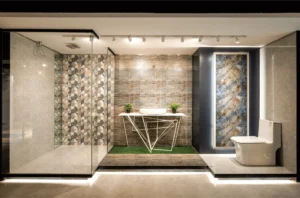
Surging Potential of CBC Tiles: In conversation with Sayma Islam
China-Bangla Ceramic Industries Ltd. (CBC) is one of the top ceramic manufacturer companies, founded in 2001, as a joint venture private sector entity between Bangladesh and China. It produces a wide range of Wall and Floor tiles including Homogeneous, Decor and Border tiles. China-Bangla Ceramic Industries Ltd is well-known company as importer, supplier, distributor, wholesaler, retailer and manufacturer of ceramic and tiles products in Bangladesh. Everyone can depend on CBC Tiles for their commercial office, living room, bedroom, kitchen, bathroom, outdoors and stair. All products are wall and floor tiles, and cladding. Annual production capacity of unit-1 is 7.5 million sq. metre and unit-2 is 3.5 million sq. metre. Its total employees are 1200 now. It has manufacturing plants in Tarabo, Rupganj, Narayanganj (unit 1) and Charmadhobdi, Bhatpara, Panchdona, Narsingdi (unit 2). All its technology and machinery were imported from Italy, Austria and China. The Chairman of the company is Ferdousi Islam, Managing Director Mr. Md. Shirajul Islam Mollah, CEO and Director Sayma Islam. China-Bangla Ceramic Industries Ltd. A top ceramic manufacturer of BD CBC is a well-known competitor and a leading brand. Ceramic Bangladesh recently had the opportunity to sit with Sayma Islam, CEO of CBC, for a delightful tête-à-tête and learned about the insights of CBC, their tested strategies and future plans. What is your leadership philosophy in creating that change? “It’s been 10 years since I’ve joined CBC. I was appointed as a CEO but I didn’t know what that meant at the time. I was at my learning stage and it took me 2-3 years to figure out the role. My father grew the business with his own hands, and when I joined, I wanted to introduce something that would make CBC better. I wanted to set the vision. It’s a full Bangladeshi company now since we have taken over but we kept the name. And as the newer generation I wanted to introduce sustainability. I set the vision for the company and inherited the norms and traditions from my father. But I got out of the norm and visualised how I wanted the company to grow. I changed the logo and gave it a new look. Set up another factory that is capable of manufacturing modern tiles. And we focused on competing with foreign products that were doing well locally. The team took instant decisions and found out ways to catch up with the industry’s unceasing changes. Now that everything is more digitised, the technology sector is going through rapid transformation. Just a couple of years ago, the industry lacked skilled manpower and had to import raw materials. Now we have all the gaps filled. CBC hires foreign experts now who mostly work in the R&D (research and development) department. This is one of their strategies that helped them immensely.” What do you think has been the key to its success? “We are raising the bar every time by looking for better technicians, using better raw materials, and researching more and more. We chased better quality and looked at the market to see what was in demand. We worked on the designs and quality according to that demand. We started CBC and it’s been 20 years plus already. And when we started there wasn’t anything called ceramic tiles. We are the second introducers of foreign tiles substitute. One of our biggest contribution would be that we’ve increased the local demand for locally made ceramic tiles. Now there is a huge variety of tiles and we focus on CRM when it comes to selling ours in the market.” How do you smoothly manage such a sensitive part? “Most of the employees we have, have been with us for a long time. We give two days off and provide a friendly, newly introduced corporate environment. We are paying incentives, we provide support system for a deceased employee’s family and we motivate our employees to gladly work with us with diligence.” Ceramic industries should focus on research. Ms. Sayma said, “The more R&D we do the better this sector will get. If we can maintain quality in production then the finished good will be good as well.We need modern solutions and constantly research for updated product designs.The market is growing but it hasn’t reached saturation point. We are focusing on constant growth. We are also thinking about real estate now that we have developed so much. We already have 3 ongoing projects. Our plan is to branch out with real estate, cement factories, and sanitary ware.” She added, “What keeps me focused is my father. He plays a gigantic role in our upbringing. Fifteen years back, women weren’t on this scene. After my joining we expanded to another factory, and we are working on a third plant.
Read More
CHARU-The Luxurious Sanitary Ware Brand
CHARU Ceramics has offered a new choice for decorating bathrooms in Bangladesh. CHARU has been able to make the use of luxury bathroom materialls easily possible go the mass people. Whereas it used to cost around Tk. 4,00,000 on an average earlier to build a luxurious bathroom, CHARU can supply the same quality of luxury products for Tk. 50,000 to Tk. 1,00,000 only. This is the great achievement of the Bangladeshi brand. CHARU Ceramic Industries Limited was incorporated as a company in March 2012 and started its journey from 2017 by producing world-class sanitary ware in the country. It is the first international major standard sanitaryware manufacturing plant in Bangladesh with the assistance of the best consultants from Europe and Asia. This sanitary ware manufacturer, certified by ISO 9001:2015, has collaborated with COTTO, one of the most popular brands in the world. Some 1,800 skilled workers are working in the CHARU Sanitary ware factory established in Madhabpur, Habiganj. The plant is equipped with state of the art technology such as robot glazing, high pressure casting, advance kiln and molder and the latest and advanced manufacturing machinery of sanitary wares from SACMI, UNIMAK and HEXIANG with production capacity of 1.5 million pieces a year. Machineries of the world’s most renowned companies such as Gaiotto, Riedhammer and Unimak are installed to produce the best quality of sanitary ware in CHARU Ceramic Industry. It is remarkable in the history of Bangladesh’s sanitaryware industry that CHARU manufactures one of the most internationally recognised sanitary ware brand ‘COTTO’ in Bangladesh with technical collaboration of Siam Sanitary Ware Industry Co. Ltd., Thailand. COTTO is helping it to achieve the best quality by providing technological support, knowledge transferring and trained employees. Currently, a wide range of water closet, wash basin, urinal and squat pan are produced by both the brands CHARU and COTTO – and these are manufactured in the country with utmost care and skills. CHARU ceramic wants to become the number one sanitary ware brand in Bangladesh with the finest products and efficient services. CHARU Ceramic Industries Limited has been set up initially to fulfill the domestic market demand for products and then to export. Manufacturing products of higher standarcs, CHARU gives the customers with proper value and extreme durability of the products. The products have unique designs and it upgrades products range every year with hot designs. CHARU is manufacturing products using the latest technology. While showing internationally recognised innovativeness and proving technological ability, flexibility and adaptability, CHARU can meet the demand of mass production. Interview with Managing Director Quality, Design and Plumbing services are the main pillars of CHARU’s success The name ‘Charu’ itself associates with the meaning of finesse. Although the local sanitary market in Bangladesh is still very young, the sector is growing rapidly, thanks to the growth of middle class, change in their taste and rapid urbanization process,” said Mohammad Shamsul Huda, Managing Director of CHARU Ceramics. He told Ceramic Bangladesh that the current market for sanitary ware in the country is in a range of Taka 1,000 crore to Taka 1,200 crore a year. CHARU owns 20 per cent of the market share, he said and added that because of the construction boom, this market is growing at a rate of 15-20 per cent every year. The demand for sanitary products is increasing in the villagesas well. And thedemand for commodes is increasing in the cities, he pointed out. The managing director mentioned that CHARU continues to compete with the imported foreign products of similar quality. However, CHARU is keeping an eye on the price so that it is more affordable than the imported products. Mr. Shamsul Huda said that although the annual production capacity of CHARU is 1.5 million pieces, its current production is 60 per cent of its capacity. It will increase to 80 per cent this year, he mentioned. However, production is also being affected due to the gas crisis. Mr. Shamsul Huda has about 40 years of experience in the business of sanitary products in Bangladesh. He got involved with this business by setting up Bengal Agencies in the early 1980s. At first there was the business of mosaic, granite marble and white cement. From the import-dependent trading business, he gradually developed the Great Wall Ceramics Industry, CHARU Ceramics, Elephant Brand White Cement and Siam-Bangla Industries in the country. the country. The bathroom fittings industry will also start soon under the group, he said. In all cases it has retained the international standard and taste. As a result, there is a huge demand for these sanitary products at home and abroad. However, due to increase in domestic demand, it can’t meet the full demand of the domestic market. CHARU and Great Wall products are being exported to countries like the US, India, Pakistan and the countries of the Middle East. It is especially in high clemand in the ‘Seven Sister’ states of north-east India. Participating in fairs in Qatar, Pakistan and India, this Bangladeshi company has recently received huge response, the managing director said. Mega projects like Rooppur Nuclear Power Plant, Matarbari and Payra Power Plant, Karnaphuly Tunnel and Metro Rail in Bangladesh have received huge supplies of CHARU, COTTO and Great Wall products. Talking about the success and popularity of CHARU, Mohammad Shamsul Huda said that CHARU is working jointly with the COTTO brand of Thailand. Dwelling on the shortage of designers in the sanitary ware industry, Mr. Shamsul Huda said that design is changing rapidly. “In order to increase exports, we have to create more diverse products and increase the number of designers in the country” he said. He added that to help brand Bangladesh’s own industry, the government should provide more assistance in this sector. “Number of ceramic institute should be increased. Emphasis should be given on finding world class designers by opening ceramic faculty in Art Colleges.” Tejgaon Ceramic Institute in Dhaka is not enough to meet the demand of the time, he said, adding that only diploma
Read More
